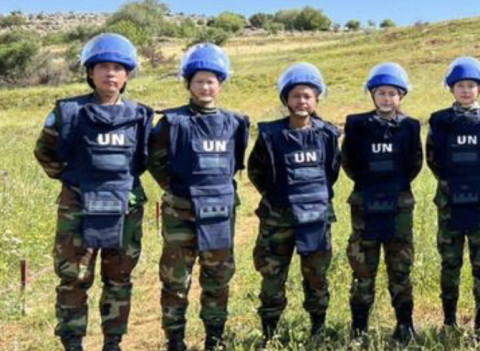
GCED Basic Search Form
Quick Search
현재 위치
뉴스

In the first event, UN Secretary-General António Guterres laid a wreath at a memorial honoring the lives of more than 4,300 military, police and civilian peacekeepers who have died in the line of duty since the UN deployed its first missions in 1948.
76 years of service and sacrifice
For 76 years, UN peacekeepers have worked to save lives and change the lives of people living in the world's most fragile political and security situations. Since 1948, more than two million uniformed and civilian personnel have helped countries transition from war to peace. Today, more than 76,000 men and women from 121 countries are deployed in 11 UN peacekeeping operations.
This year's celebration comes under the slogan: “Ready for the future, we build better together.” It highlights the valuable contributions made by military, police and civilian peacekeepers over the past seven decades, and embodies the spirit of progress and collective work towards creating a more equal, just and sustainable world.
In the second event, the Secretary-General also presented the “Dag Hammarskjöld Medal” in honor of the memory of 61 women and men, from 33 countries, who are peacekeepers, who gave their lives, during the past year, while performing their duty in peacekeeping missions in various parts of the world.
The Secretary-General also presented Major Radhika Sen, of India, with the prestigious 2023 UN Military Gender Advocacy Award.
Different in their destinations but united in their goal
Before beginning his speech at the event, United Nations Secretary-General António Guterres asked the audience to stand for a minute of silence, in honor of the peacekeepers who sacrificed their lives for the cause of peace. He extended his deepest sympathy to the families and friends of the peacekeepers and victims. He stressed, "We will never forget them."
He said that the memory of the fallen Blue Berets reminds us of the tragic human cost of the conflict, and every loss of life underscores the urgent need to prevent violence, protect the most vulnerable groups, and spare no effort to end these deadly conflicts. He explained that the Blue Berets come from all over the world but are united in their mission for peace, doing their essential work in some of the most dangerous places in the world.
The Secretary-General said that peacekeepers are a true model of multilateralism. “They have shown us what peace looks like by protecting the most vulnerable. Maintaining fragile ceasefire agreements. Defusing local conflicts. Clearing landmines and explosive remnants of war. Strengthening local institutions and systems.” Democracy on which peace and development depend.
Listening to women's voices, supporting and protecting them
Nearly 25 years ago, the Security Council adopted historic Resolution 1325 on Women, Peace and Security. The resolution reaffirmed the vital role of women in preventing and resolving conflicts. He recognized that the full and equal participation and inclusion of women was essential for peace.
Since then, the Secretary-General said that UN peacekeeping forces have made unremitting efforts to achieve this commitment, and have made progress to ensure that the voices of women living in conflict areas are heard, supported, protected and empowered.
In this regard, the Secretary-General congratulated Major Radhika Sen on winning the Gender Advocacy Award, praising her work in an escalating conflict environment in North Kivu (Democratic Republic of the Congo), where her forces actively engaged with conflict-affected communities, including in particular women and girls.
He added: “Major Sen is a true leader and role model. Her service represents a real source of pride for the entire United Nations. I thank her and all peacekeepers for their service, leadership and commitment to the women, peace and security agenda.”
Gender perspective in peacekeeping operations
Major Radhika Sen worked in the Democratic Republic of the Congo from March 2023 to April 2024, where she amplified women's voices, created safe spaces for men and women to work together, and strengthened gender-sensitive peacekeeping operations. She is the second Indian peacekeeper to receive this award. At the event, a short film was shown about her work in the field.
Speaking at the event, Major Sen said: “This award is special to me because it recognizes the hard work of all peacekeepers working in a challenging environment.”
She added that through her work, she had the opportunity to engage and interact with local communities on topics ranging from women, health, education, child care, gender equality, women’s employment, and combating sexual violence in conflict, in addition to various skills development programs to enhance self-reliance.
She stressed that a gender perspective in UN peace operations is essential for an effective, comprehensive and sustainable peace process, noting that women and girls are disproportionately affected by conflict, and face increasing risks and violations.
From Lebanon to South Sudan, peacekeepers are making a difference
For his part, Under-Secretary-General for Peace Operations Jean-Pierre Lacroix said that peacekeeping forces make a tangible difference in the lives of millions of people around the world.
He added: “In southern Lebanon, peacekeepers play a critical role between the IDF and the Lebanese Armed Forces to help prevent current dangerous tensions from escalating further. They protect hundreds of thousands of civilians in the Central African Republic, South Sudan and the Democratic Republic of the Congo. Today, we salute more than 4,300 men.” and women who lost their lives while serving under the UN flag since 1948.”
